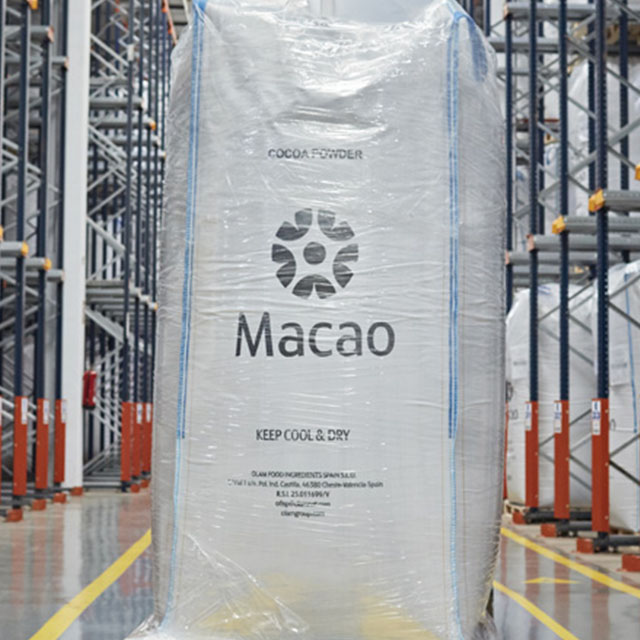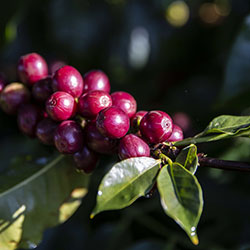Spain is the world’s second largest importer of cocoa solids and a large cocoa processing country with a rich chocolate tradition. ofi was established in Spain in 2011 in Valencia and increased the cocoa powder proposition through the acquisition of Macao, a well-recognised brand with a strong market share.
Our management team has over 30 years’ experience in cocoa and maintains strong relationships with Spanish chocolate and confectionery manufacturers, snack companies and powder users. We have created a marketing and manufacturing centre of excellence for cocoa powder and are a leading supplier to the chocolate beverage and biscuit industries in the Iberian and North African markets. The Macao brand is sold in 36 countries globally with a strong growing presence in Middle East and Russian regions.
Macao adds value to cocoa cakes coming mainly from the Ivory Coast, completing the supply chain model. The Valencia plant leads the way with excellent Food Safety Quality Assurance processes.
In December 2012, we acquired SEDA Soluble Coffee, a brand which has been associated with the production of private label and bulk coffee since 1957. A new, accomplished management team were implemented into the business.
SEDA Outspan Iberia SLU has 3 locations. A manufacturing plant in Palencia; the centre in Villamuriel manages packing and logistics; whilst the office in Madrid supports the commercial activities.
At our plant in Palencia we process soluble coffee and mixes of coffee with chicory or cereals, pure instant chicory and mixes of cereals without coffee.
We operate robust quality audit systems and maintain third-party certifications. The coffee operations in Spain primarily service the European market, whilst the plant in Vietnam supports Asia.
Through SEDA we offer private label solutions to coffee customers across Europe with a range of different packaging types.
Read ofi news
By Andrew Brooks, Head of Cocoa Sustainability, olam food ingredients (ofi)
This week, the world’s attention turns to a heavy burden that can damage a child’s Health and Education: child labour. In ofi's cocoa business, we are focused on solving this problem every day.
Most child labour in cocoa relates to children carrying out hazardous tasks on the family farm, distinct from the much rarer issue of forced labour, and has no one cause. Labour laws can be misunderstood, and schools might be located far away. Even if there is a school nearby, children may not have the documents they need to enrol. When combined with rural poverty, many parents think their child’s time is best spent helping on the farm. And now, these cocoa-growing communities are also battling a global health pandemic.
We’re working to tackle each of these challenges in turn. Under our Cocoa Compass sustainability ambition, we aim to completely eradicate child labour from our direct supply chain by 2030 and ensure farmers’ children can access the education they are entitled to. In 2020, we reached the critical milestone of rolling out child labour monitoring across 183,000 households in nine countries.
There is still a lot to do, and collaboration with our customers, national governments, and civil society is essential. For example, we recently asked the Fair Labor Association (FLA) to assess the extent to which cocoa farmers and their families have benefited from our sustainability programmes in Côte d’Ivoire, their perception and satisfaction with these interventions, and help to refine our approach further.
Using a due diligence methodology called Social Impact Assessment, the FLA collected extensive data and interviewed over 450 people from ten cocoa communities, including women and children. It found that of all our efforts to tackle child labour, the setting up of child labour monitoring and remediation and enabling access to education are the most advanced and have the most significant impact.
It also revealed that over two-thirds of those interviewed think child labour is on the decline in their community, and 80% believe that the interventions by ofi and our partners are contributing to protecting children.
There are areas for improvement. The FLA suggested we provide additional support to help farmers access affordable labour. And ensure greater follow-up with Village Savings and Loans Associations to maximise their ability to promote child protection.
We know that combining our efforts through multi-stakeholder partnerships, championed by local and regional governments, and supported by international finance institutions, is the best way to create the kind of long-term systemic change needed to reach universal school attendance
and graduation for children in cocoa communities.
This World Day Against Child Labour reminds us that if we want to put children first in cocoa, we must be open to testing new approaches and adapting our efforts based on what works best. The future of a cocoa generation is at stake if we don’t.










